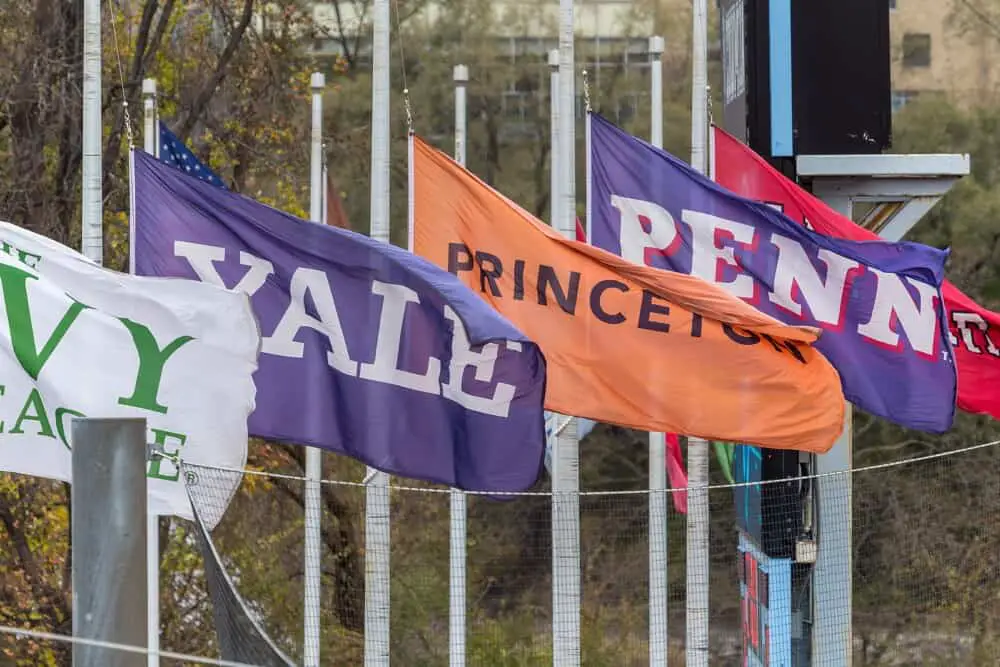
Higher education decisions are something that affects all high schoolers (and their families). Truth be told, most parents started thinking about it when their little bundles of joy first appeared! But is higher education really necessary?
Higher education is overrated for most students who attend. When 70% of high school graduates attend higher education but just over a third actually graduate in 4 years, something is wrong! Students are being pushed into college at an alarming rate.
In a study published by the NCES (National Center for Education Statistics) researchers found that 70% of high school graduates attend public higher education. According to research compiled by NPR, the public 4 year college completion rate is an alarming 37.3% of that number even after six years. It’s time to take a harder look at higher education and (often better) alternatives.
Contents
Different Types of Higher Education
Higher education isn’t just one thing/route. There are several sub-groups that comprise the category of higher education. Those are Ivy League and private 4 year universities and colleges; state/publicly-funded schools; and community colleges. Let’s consider each just a bit.
Ivy League & Private Schools

Though the ‘Ivy League’ began as a term to connect 8 universities in the northeastern area of the United States for sports purposes (and continues to this day), its title eventually became synonymous with academic excellence, social selectivity, hierarchy and economic wealth. The Ivy League is well-known globally for its prestige, exclusivity, and expense.
From Harvard to Cornell, students who attend Ivy League historically have been thought of as the brightest among their peers. An Ivy League education is particularly sought after by those with business and/or political aspirations.
Like Ivy League, private 4 year universities and colleges are well regarded for their low acceptance rate and thus, considered top schools for the brightest students. They are also quite expensive and therefore, exclusive to only the most wealthy and few scholarship recipients.
State Schools

State universities and colleges are great bargains in comparison to private higher education institutions. Schools like Georgia Tech and Cal Tech are respected for their science background; University of Virginia at Charlottesville and University of California, Berkeley have historical and political appeal for many, as well as a stout academic record.
However, the main allure of state-funded schools is that you get a pretty good, well-rounded education, at an affordable price wherever you go.
Now it must be said that this is all contingent on attending YOUR state school, because ‘in-state’ tuition is what constitutes the affordable factor. Out-of-state students are basically paying private-school comparable fees!
Because they are publicly funded, state schools are more standard in their practices and instruction, and more likely to award scholarships, enticing factors, to be sure, for students (and parents).
Community Colleges
Joliet Junior College out of Illinois is recognized as the first community college in the United States, established in 1901. Now there are over 1,462 community colleges across the U.S. With the rise in tuition for 4 year colleges and universities, community colleges are more popular than ever.
Community Colleges, sometimes referred to as ‘junior college’, are like the little sibling of 4 year institutions. Students are able to obtain an associate’s degree at community colleges, but most use it as a soft start to college life, opting to take general education courses there, prior to transferring to a 4 year school after their sophomore year.
Community Colleges offer smaller class sizes, more attention from instructors, and their biggest draw, cheaper courses than 4 year schools.
Our son, Brandon, transferred after one year at a well-known 4 year university to our local community college, where he was able to take courses for half the price to obtain an associate’s degree. A smart move in our opinion as parents!
Continuing Education-Grad School
The ultimate higher education involves the returning student. These are students who return to college or university to add additional courses to their Curriculum Vitae; want to add an endorsement or credential usually for career promotion; or go all the way by adding a second or advanced degree, again for career promotion or job change altogether.
In these cases, students may utilize community school, state school, or a 4 year college or university, regardless of what they did the first go around. You certainly aren’t committed to one because it is what you used before.
One’s selection may tie to an already chosen career path or be an attempt at a career change. Rarely, but sometimes, continuing education may be simply due to interest.
Purpose of Higher Education
What is the reasoning behind higher education? Is it to get a better job, diversify and increase one’s opportunities and bank account, or simply, to learn? Is it like Dr. Johnetta Cole expresses in the video above, for scholarship and to provide service to others and make the world a better place?
The James G. Martin Center for Academic Renewal says there are two primary, non-debatable, reasons for higher education. One is to educate. According to Cardinal Henry Newman, “a way to instill a habit of mind…which lasts through life.” And the second is “the search for truth.”
The journal article, Educating Students About the Purpose of Higher Education, says most students today are only focused on how higher education relates to their job prospects.
Let’s look at these conflicting ideals surrounding higher education and their usefulness today.
Higher Education Then…
One of the earliest purposes for higher education was to train clergy. After the American Revolution, it included education for those in the ministry, medicine, and law. Around the 1800s, higher education changed to allow its focus to include more practical training such as agriculture and technological fields like engineering.
Along this trajectory you can see the changing purpose from ideological (clergy-minded, serving others, betterment of society) to practical means, such as job training to support families and an economic-shift.
Higher education was originally for those of a wealthy or educated family. The peasant or poor farmer’s child rarely saw the inside of a primary school house, let alone institutions for higher education.
Higher Education Now…
The number one reason people go to college today is money. The Bureau of Labor Statistics (BLS) says that college graduates will earn 1 million dollars more than non-graduates over a lifetime. That’s one million reasons to attend and graduate from college by most people’s standards!
NCPLANFORCOLLEGE.ORG gives other follow-up reasons high school graduates are attracted to college: break out of their shell, see the world, get involved, and to learn a skill, for example.
However, as a former teacher in a prominent, accredited Los Angeles charter school, I can tell you a huge reason students attend college is because it has become the new AMERICAN DREAM.
College is the ultimate focus of public and private k-12 schools.
A direct quote from their website highlights this: “The schools are designed to significantly increase college entrance and graduation rates.”
In 1965, Statista reports, there were about 6 million college students in the United States. In 2018 that number grew to almost 20 million! Want to know something else that changed? The push in American schools for higher education.
So much so, that few students consider alternatives; many of these students would greatly benefit from them, too!
Alternatives to Higher Education
Surprising to many students is that college is not the only option out of high school for success. With the increasing cost of colleges and universities, it behooves students (and parents) to look into other options, besides a degree.
With owning your own business ranking highest at 41% on a Dream Job poll according to Ken Coleman, a career expert and national radio host, is higher education really necessary for the majority of students who use job prospects as their goal for attending college?
As a former public school teacher with over 20 years experience in teaching, as well as a person with three degrees, I urge you to consider all options!
Job Force
Though rare today, it is possible to go directly into the work force after high school graduation AND live a successful, happy life. Of course, it all depends on the student and the job, right?
Many management positions pool from within their organization. Working from the ground up in hotel, restaurant, and other service oriented fields is possible, and enjoyable to a lot of people.
Family owned businesses are also an option for some. There are over 5 million family-owned businesses in the US, which employ 63% of the workforce. If this is an option for your child, it is highly likely that higher education for monetary purposes isn’t necessary, so why pay the added expense?
Trade School
If community colleges are the little sibling to colleges and universities, then trade schools are the cousin. Trade schools are generally for-profit institutions that teach a specific skill (‘trade’), such as drafting, nursing, cosmetology, welding, plumbing, autobody repair, and carpentry.
Upon completion and passing of the course, you are provided a certificate to show your training.
Trade schools aren’t cheap, but they are certainly less expensive than even community college, and unlike community college, successful participants have proof of being ready for the work field at the end of their studies!
Military

Each year over 180,000 high school graduates join branches of the military (the US Navy, Army, Air Force, Marines, and Coast Guard). It may surprise you that the enlistment consists of 2/3 of the top half of America in math and verbal skills.
Those joining the military are proportionate to the US population overall and “are solidly middle-class.” Some might have grown up thinking the military is a good alternative to those with less than stellar records, but contrary to this, military standards actually prohibit those with criminal records.
After obtaining his associate’s degree, our oldest child came to the realization that college wasn’t the right choice for him and staying in just to complete the degree was a waste of time, money, and effort. He enlisted in the US Air Force summer of 2019.
Today he maintains it is the best decision he could have made, given his interests and skills, career-wise, and for his growing family. And he and his wife bought their own house recently while he’s stationed in Texas. How many 25 year olds can say that?
With signing bonuses, generous health care, reliable income, money for future education, cost of living allowances, and more…it’s not hard to see how many graduates could benefit from joining the military!
Why your child does NOT need Higher Education
Given my background in education, it is a shock to many that I’m not sold on higher education. But honestly, I think it makes me the most qualified person to ask!
Reason number 1 to NOT go to college: Tuition rates are astronomical in even the most modest of settings. In our great state of Virginia, the cost of attending a 4 year school is on average over $15,000 per year for tuition alone! Double that for any room, board and books. And consider that Virginia is middle of the pack, rate-wise!
Reason number 2 to NOT go to college: Many students aren’t ready and don’t have a direction, so going to school is fruitless. Students either squander their time partying and failing out of class OR take course after course, changing majors along the way, because they don’t know what they want to do in life.
College is an expensive and unnecessary way to find yourself!
Reason number 3 to NOT go to college: Alternatives make more sense. If your child wants to be the next Gordon Ramsey or Vidal Sassoon, college isn’t the best route; try culinary or cosmetology school instead (while also getting a job in a kitchen or local salon sweeping the floors to learn the trade firsthand while earning an income to boot.). Despite what k-12 education wants to tell you, alternatives can often prove more profitable.
When Higher Education Makes Sense
Now it’s not to say some shouldn’t go to college! As a public school teacher, I absolutely had to go to college for my career. There was no alternative to earning my teaching certificate or procuring a teacher position in the local elementary, middle, or high school.
Reason number 1 to go to college: Career Choice mandates it. For those studying law, medicine, and engineering (and a few others), there is no suitable alternative than attending higher education. For them, like me, it is essential and makes sense to do so.
Reason number 2 to go to college: Cost isn’t an issue. For our daughter, Alexis, it absolutely made sense for her to go to college (in her case, Louisiana State University, #LSU #GeauxTigers). This isn’t because she knew what she wanted to do; in fact, she has switched majors every year (shh, don’t tell her I told you so!)! But for her, cost wasn’t (isn’t) an issue.
LSU awarded her an academic scholarship that not only pays for her out-of-state tuition and fees, but also her apartment, transportation, books, and food! Absolutely everything school related was (and is) covered, plus a bit of taxable money left over!
Essentially, she’s paid to earn her degree, so why not? Side note: She’ll graduate in May 2021 with a biology degree and minor in German, while also possessing teaching certificates in both fields of study. Quite solid choices for someone who wasn’t quite sure what she wanted (wants) to do with her life, huh?
So it should be said, if money isn’t an issue for you, whether you are awarded a scholarship or your family is wealthy, and you strongly desire the college experience, of course, then it a sensible choice for you.
Reason number 3 to go to college: You have a passion for learning! Yes, if you are able to afford it somehow, AND you love the act of learning, higher education is for you! There is probably no better time in life for learning than when you first leave high school, nor better avenue for pursuing it, than when you go to college.
Higher Education is the place to philosophize, search, question, ponder, dispute, gain, disregard, attain…It is the place to become critical in the best sense of the word. Will higher education teach you to get a job? Perhaps not…but it will teach you to think. For some, that is more than enough!
Higher Education Wrap Up
So here we are…at the end of a teacher’s point of view of higher education. What have we covered? Let’s review…
- There are different routes to Higher Education: Ivy League; private 4 year colleges & universities; state schools; and community colleges
- Purposes for Higher Education vary but the 2 most often cited are better jobs/successful career and expectation built from K12 education
- Alternatives are better for some: Workforce, trade schools, military can all be successful options.
- There are reasons for it, and not: it really depends on you and your situation.
I’m not against higher education. As a teacher and person with three degrees, I certainly see the validity and necessity for some. I am against the idea that higher education is for everyone and should be pushed on students as the best option after high school because this is simply, quite obviously not the case.
